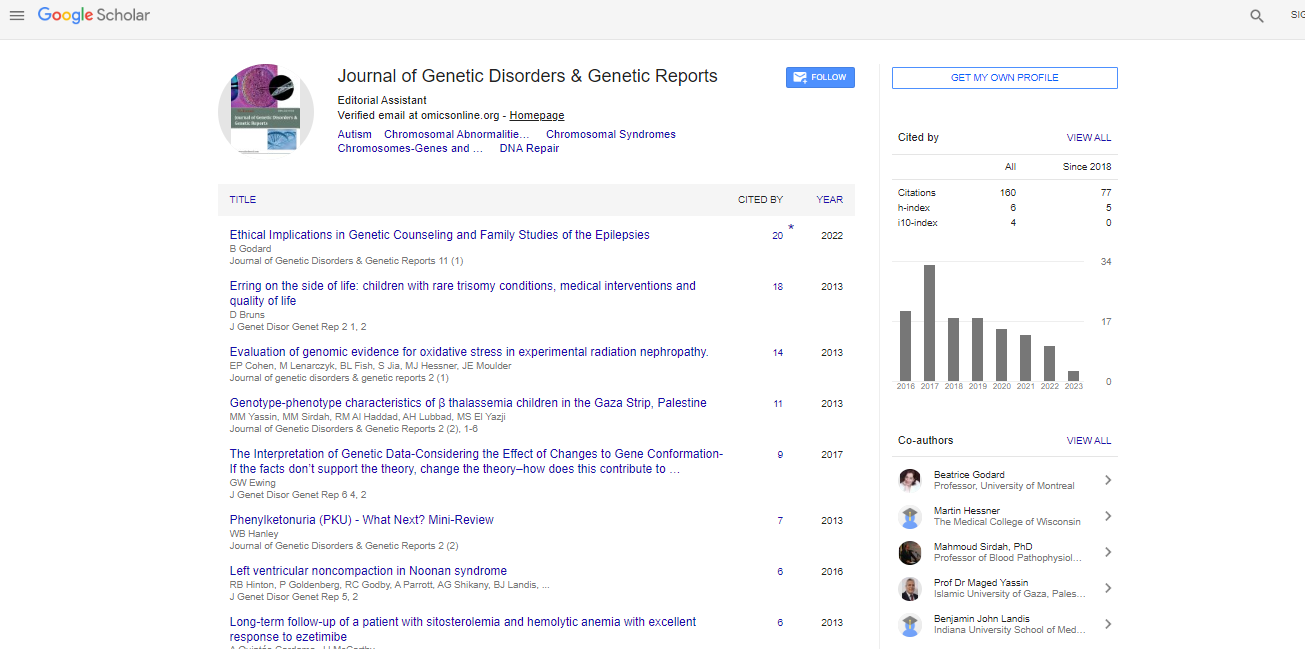Opinion Article, Vol: 12 Issue: 2
Unraveling Rare Genetic Variants and Their Clinical Implications
Storgaard Nordestgaard*
1Department of Cardiology, Aalborg University, Aalborg, Denmark
*Corresponding Author: Storgaard Nordestgaard,
Department of Cardiology,
Aalborg University, Aalborg, Denmark
E-mail: storgaard.ordestgaard@rm.dk
Received date: 29 March, 2023, Manuscript No. JGDGR-23-99539;
Editor assigned date: 31 March, 2023, Pre QC No. JGDGR-23-99539 (PQ);
Reviewed date: 14 April, 2023, QC No. JGDGR-23-99539;
Revised date: 21 April, 2023, Manuscript No. JGDGR-23-99539 (R);
Published date: 28 April, 2023, DOI: 10. 4172/2576-1439.1000194
Citation: Nordestgaard S (2023) Unraveling Rare Genetic Variants and Their Clinical Implications. J Genet Disor Genet Rep 12:2.
Abstract
Rare genetic variants refer to genetic alterations that occur at a low frequency within the population. Although individually rare, these variants collectively contribute to a significant burden of genetic disorders. Unraveling the mysteries surrounding rare genetic variants and understanding their clinical implications is a rapidly evolving field that holds immense promise for personalized medicine and improved patient care. This paper aims to explore recent advancements in the identification and characterization of rare genetic variants, as well as their clinical implications.
Description
Rare genetic variants refer to genetic alterations that occur at a low frequency within the population. Although individually rare, these variants collectively contribute to a significant burden of genetic disorders. Unraveling the mysteries surrounding rare genetic variants and understanding their clinical implications is a rapidly evolving field that holds immense promise for personalized medicine and improved patient care. This paper aims to explore recent advancements in the identification and characterization of rare genetic variants, as well as their clinical implications.
The identification and characterization of rare genetic variants are essential for understanding their contribution to disease pathogenesis. Recent advancements in genetic technologies and computational algorithms have significantly enhanced our ability to detect and analyze these variants.
Next-Generation Sequencing (NGS) technologies have revolutionized genetic research by enabling the rapid and costeffective sequencing of the entire genome Whole Genome Sequencing (WGS) or specific coding regions (whole exome sequencing, WES). These approaches have facilitated the identification of rare variants and their association with various genetic disorders. Furthermore, targeted sequencing panels, focusing on specific disease-associated genes or genomic regions, have been developed to enhance the detection of rare variants in specific clinical contexts.
The integration of bioinformatics tools and databases has played a crucial role in the characterization of rare genetic variants. Algorithms for variant calling, annotation, and prioritization aid in distinguishing pathogenic variants from benign ones. Publicly accessible databases, such as the Genome Aggregation Database (gnomAD) and the Exome Aggregation Consortium (ExAC), provide comprehensive allele frequency data across diverse populations, enabling the identification of rare variants.
Rare genetic variants have profound clinical implications, influencing disease susceptibility, prognosis, treatment response, and genetic counseling. Understanding these implications is essential for providing accurate diagnoses, prognostic assessments, and personalized therapeutic interventions.
Rare genetic variants pose significant challenges in clinical diagnosis due to their low prevalence and phenotypic heterogeneity. However, advancements in genetic technologies and data sharing have improved diagnostic accuracy. The identification of rare variants associated with specific phenotypes aids in accurate disease classification and the development of targeted diagnostic tests.
Rare genetic variants can also provide valuable prognostic information. Variants associated with specific disease outcomes or clinical phenotypes can guide prognostic assessments and inform patient management. For example, certain rare variants may be associated with a more severe disease course or an increased risk of complications, allowing clinicians to implement appropriate monitoring and early intervention strategies.
Rare genetic variants have implications for treatment selection and response. Understanding the genetic underpinnings of a disease can guide therapeutic decision-making, facilitating the development of targeted therapies. For instance, the identification of rare variants in cancer patients can guide the selection of specific targeted therapies that address the underlying molecular abnormalities driving tumor growth.
Pharmacogenomics, which examines how genetic variations affect drug response, is another important aspect of therapeutic implications. Rare variants in drug-metabolizing enzymes, transporters, or drug targets can significantly impact an individual's response to medications. Pharmacogenomics testing can help identify patients who may require dose adjustments or alternative medications to optimize therapeutic efficacy and minimize adverse reactions.
Rare genetic variants often have implications for genetic counseling and family planning. The identification of pathogenic variants associated with hereditary conditions allows for informed genetic counseling, enabling individuals and families to make educated decisions regarding family planning, reproductive options, and risk assessment for future generations. The study of rare genetic variants contributes to the broader understanding of disease mechanisms and the development of innovative therapeutic approaches.
 Spanish
Spanish  Chinese
Chinese  Russian
Russian  German
German  French
French  Japanese
Japanese  Portuguese
Portuguese  Hindi
Hindi 



